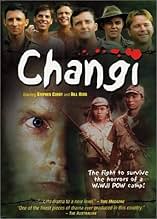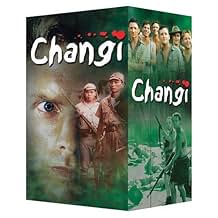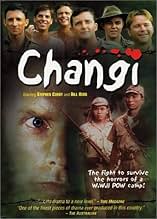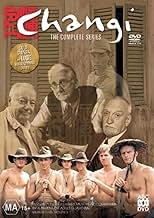Füge eine Handlung in deiner Sprache hinzuSix young men experience pain and horror during their stay in the Japanese Prison Camp during World War II.Six young men experience pain and horror during their stay in the Japanese Prison Camp during World War II.Six young men experience pain and horror during their stay in the Japanese Prison Camp during World War II.
- Auszeichnungen
- 3 Gewinne & 7 Nominierungen insgesamt
Folgen durchsuchen
Empfohlene Bewertungen
10leggatt
When I heard there was to be an ABC [Australian Broadcasting Corporation] mini-series based on life in Changi [WWII POW] camp... with a focus on "elements of comedy", I was deeply sceptical and somewhat critical.
My father had served in the second world war. Such was the barbarity of the Japanese, he was able to talk about the horrors in and around Labuan (where he was stationed), until only quite recently. Along with my father, I had been awarded the fortune of knowing many great men (of stronger character and spirit than I shall ever have), who had witnessed acts of unspeakable barbarity at the hands of the Empire of Japan, and had never completely recovered. The name 'Changi' is destined to conjure horrific images for ages to come...
But upon viewing, I was highly impressed with the cast, the characters and the complex plot-lines of this wonderful series. I now regard 'Changi' as the highlight of my week, (bear in mind, I have viewed only three episodes so far... I hope the remaining episodes adhere to the standards set by the first three).
The black humour works uncannily well (however, the flatulence jokes are a little overdone), and while much of the horror has been suppressed, the series comes quite close in relaying the undaunted spirit of the survivors who were able to later continue with their lives in spite of the inhibiting memories.
The 'flashback' format of this series will be difficult for some to follow,
but I can not think of no better way to do adequate justice to the men who suffered deep emotional scarring proceeding internment... when painfully suppressed experiences are remembered, sometimes years after the horror.
One of the darkest chapters of the Second World War, the 20th century, and, (I would go so far as to say), in the history of mankind, is being relayed to a new generation through this series, and I hope it serves to relay the overwhelming adversity borne by the wartime generation.
Proceeding 'Changi', I don't think I shall ever be able to listen to the poignant tune 'on the road to Gundagai' in the same way again. Tune in...
My father had served in the second world war. Such was the barbarity of the Japanese, he was able to talk about the horrors in and around Labuan (where he was stationed), until only quite recently. Along with my father, I had been awarded the fortune of knowing many great men (of stronger character and spirit than I shall ever have), who had witnessed acts of unspeakable barbarity at the hands of the Empire of Japan, and had never completely recovered. The name 'Changi' is destined to conjure horrific images for ages to come...
But upon viewing, I was highly impressed with the cast, the characters and the complex plot-lines of this wonderful series. I now regard 'Changi' as the highlight of my week, (bear in mind, I have viewed only three episodes so far... I hope the remaining episodes adhere to the standards set by the first three).
The black humour works uncannily well (however, the flatulence jokes are a little overdone), and while much of the horror has been suppressed, the series comes quite close in relaying the undaunted spirit of the survivors who were able to later continue with their lives in spite of the inhibiting memories.
The 'flashback' format of this series will be difficult for some to follow,
but I can not think of no better way to do adequate justice to the men who suffered deep emotional scarring proceeding internment... when painfully suppressed experiences are remembered, sometimes years after the horror.
One of the darkest chapters of the Second World War, the 20th century, and, (I would go so far as to say), in the history of mankind, is being relayed to a new generation through this series, and I hope it serves to relay the overwhelming adversity borne by the wartime generation.
Proceeding 'Changi', I don't think I shall ever be able to listen to the poignant tune 'on the road to Gundagai' in the same way again. Tune in...
A very good series, though it had great potential to be much better. John Doyle had a perfect opportunity to build six characters, make us love them, and then show the pointlessness of war and bring tears to our eyes by letting one or more of them be killed by the Japanese. Thousands of POWs died needlessly and that is the main thing that people think of when they think of Changi or any of the other camps. That fact seems to be all but forgotten about in this series. Instead of making us wonder if everyone will live through the war, he shows us right from the first second that all six of the lead characters not only survived the war, but live to the year 2000.
I have an advantage in reading other's comments before making my own. I have heard this "accuracy" comment about other movies/mini-series before and I really don't understand people's statements. Visual stories about historical events are never accurate unless they are documentaries. Beautiful Mind, and Seabiscuit are both examples of movies about true events that were off the mark where telling the whole truth is concerned.
I liked Changi because it showed the effects of war on soldiers both at the time of the event, and on their future lives. I thought the flash backs, both forward and backward, were fine--after all I want to watch a story that makes me use my brain, not just be mindlessly entertained. I thought the humor at times was sophomoric, but weren't most the soldiers in WWII of the age to be sophomoric? I loved the music, and I thought the "Singing Detective" type transition into song was very believable here, as the human mind in times of stress, pain, and torture will use its own devices to preserve sanity--the song sequences could be the writer's depiction of one way the human soul protects itself. How many of you have experienced completely weird dreams while suffering from an illness accompanied by high fever?--this is my point. As to the Japanese captors and the way they were portrayed--the commander here was, in my opinion, a detached person that let his underlings assume all of the responsibility for the horrid treatment of the POWs while the commander fed his bird and listened to music--totally detached, and I think in the end out of touch with reality. As for Lt. Aso, it was plain to see that this character was both bitter and jealous and took this out on his charges. Lt. Aso was bitter that he was not in the thick of the war instead of being stuck at Changi in charge of insulting, spirited, enemy prisoners. He also could not figure out why these enemy soldiers made jokes to laugh at, and sang songs to buoy their spirits.
I also thought the story showed that in a normal situation these six blokes would not have been friends. Their personalities were to varied--from the supremely bright to the un-educated; incredibly brave to perpetually cowering; passively innovative to unbelievably creative. However, under the situation of a POW camp these diverse individuals came together and drew from each other's strengths in order to survive, and in that situation became mates. Rowdy was the father/headmaster figure that the six turned to in times of trouble that was above their expertise. Rowdy also was available to buck them up when their spirits were flagging, and gave them hope that they would survive.
I'm buying this DVD for my WWII collection.
I liked Changi because it showed the effects of war on soldiers both at the time of the event, and on their future lives. I thought the flash backs, both forward and backward, were fine--after all I want to watch a story that makes me use my brain, not just be mindlessly entertained. I thought the humor at times was sophomoric, but weren't most the soldiers in WWII of the age to be sophomoric? I loved the music, and I thought the "Singing Detective" type transition into song was very believable here, as the human mind in times of stress, pain, and torture will use its own devices to preserve sanity--the song sequences could be the writer's depiction of one way the human soul protects itself. How many of you have experienced completely weird dreams while suffering from an illness accompanied by high fever?--this is my point. As to the Japanese captors and the way they were portrayed--the commander here was, in my opinion, a detached person that let his underlings assume all of the responsibility for the horrid treatment of the POWs while the commander fed his bird and listened to music--totally detached, and I think in the end out of touch with reality. As for Lt. Aso, it was plain to see that this character was both bitter and jealous and took this out on his charges. Lt. Aso was bitter that he was not in the thick of the war instead of being stuck at Changi in charge of insulting, spirited, enemy prisoners. He also could not figure out why these enemy soldiers made jokes to laugh at, and sang songs to buoy their spirits.
I also thought the story showed that in a normal situation these six blokes would not have been friends. Their personalities were to varied--from the supremely bright to the un-educated; incredibly brave to perpetually cowering; passively innovative to unbelievably creative. However, under the situation of a POW camp these diverse individuals came together and drew from each other's strengths in order to survive, and in that situation became mates. Rowdy was the father/headmaster figure that the six turned to in times of trouble that was above their expertise. Rowdy also was available to buck them up when their spirits were flagging, and gave them hope that they would survive.
I'm buying this DVD for my WWII collection.
Having had a great grandfather be captured and sent to Changi during World War two I was hesitant to watch this when it was first screened on TV. My great grandfather kept a diary whilst he was in captivity and when he died over there his mates bought it back and I have been lucky enough to read it and feel I have at least some idea of what Changi was really like, first hand.
This is a fantastic recount of what happened to those poor blokes who were sent to Changi Prison and shows what hardship and cruelty they witnessed in order to protect their country. It is a terrific story of mateship, commitment and Aussie Spirit, that never going to give up attitude. It is worth watching if you like Australian History or anything to do with World War Two.
I enjoyed this mini very much and give it 10 out of 10.
This is a fantastic recount of what happened to those poor blokes who were sent to Changi Prison and shows what hardship and cruelty they witnessed in order to protect their country. It is a terrific story of mateship, commitment and Aussie Spirit, that never going to give up attitude. It is worth watching if you like Australian History or anything to do with World War Two.
I enjoyed this mini very much and give it 10 out of 10.
Changi has a delightfully fresh script, acted superbly by both young and old actors alike. John Doyle has done an excellent job bringing humour to a tragic true story, keeping a sometimes sad story fun and engrossing, particularly to those of us not familiar with the events of South East Asia during WW2.
John Doyle's parallel story line successfully bridges the gap between past and present, allowing the audience insight into the long-term effect war had on the prisoners and their family's lives as well as providing the basis for an excellent narrative which nicely rounds out the tales, both individual and collective. Doyle deserves praise for this effort. We have in the past been delighted by his abundant and quick-witted humour as evidenced in his long running collaboration with Greg Pickhaver as `Roy & H.G.'
As the series is approaching half way, we are looking forward to how the story develops with anticipation.
John Doyle's parallel story line successfully bridges the gap between past and present, allowing the audience insight into the long-term effect war had on the prisoners and their family's lives as well as providing the basis for an excellent narrative which nicely rounds out the tales, both individual and collective. Doyle deserves praise for this effort. We have in the past been delighted by his abundant and quick-witted humour as evidenced in his long running collaboration with Greg Pickhaver as `Roy & H.G.'
As the series is approaching half way, we are looking forward to how the story develops with anticipation.
Wusstest du schon
- WissenswertesSet dressings were researched from photographs and WWII veterans and obtained from a variety of sources, including the ABC prop store, other Sydney prop houses, private collections, auctions, and second hand stores.
Top-Auswahl
Melde dich zum Bewerten an und greife auf die Watchlist für personalisierte Empfehlungen zu.
- How many seasons does Changi have?Powered by Alexa
Details
Zu dieser Seite beitragen
Bearbeitung vorschlagen oder fehlenden Inhalt hinzufügen
































